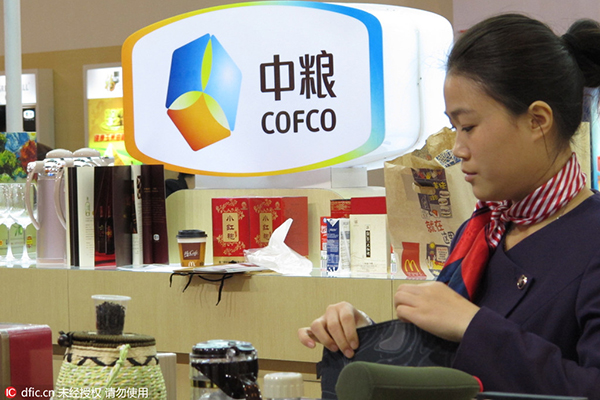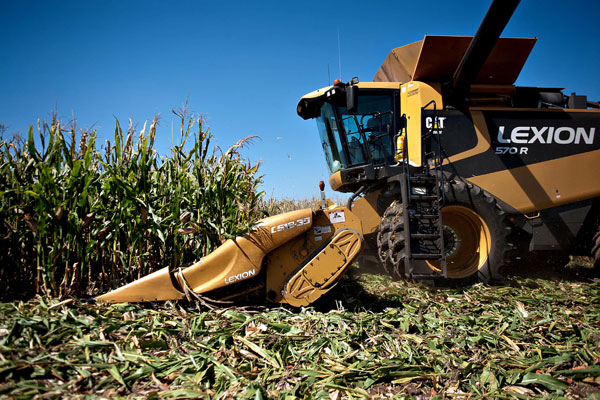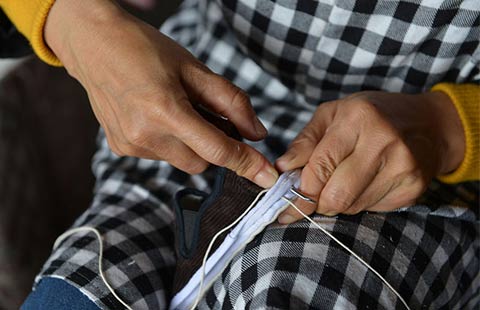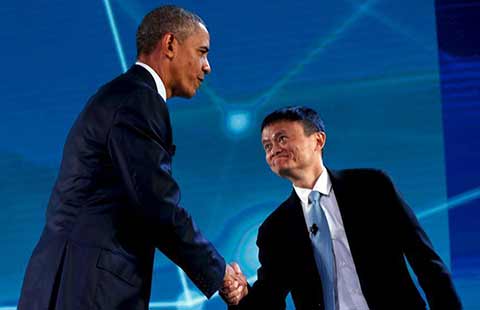Chinese food trader COFCO aims to rival global giants
By Zhong Nan (China Daily) Updated: 2016-06-15 07:59
A Chinese employee is seen at the stand of COFCO (China National Cereals, Oils and Foodstuffs Corporation) during a food exhibition in Shanghai, Nov 16, 2014. [Photo/IC]
Acquisitions to ensure food security, create world leader in supply chains and transport

State-owned China National Cereals, Oils and Foodstuffs Corp has set a target of sourcing up to 50 million metric tons of grain from overseas markets by 2020 to further ensure China's grain security, its Chairman Zhao Shuanglian said on Tuesday.
These international markets include South America, Australia and Europe, he said.
The country's biggest food trader also set goals to be able to process 30 million tons of corn, 20 million tons of soybean, 10 million tons of rice and wheat, as well as 5 million tons of sugar by the end of 13th Five-Year Plan (2016-20).
"COFCO has invested more than $3 billion in global markets over the past two years and expanded its investment activities from grain to other foodstuffs such as meat, edible oil and milk and beverages," Zhao said.
"We will become a strong rival to compete with the 'ABCD' companies," he added.
The term "ABCD" refers to the companies that currently dominate global grain trading, serving as middlemen between farmers that grow crops and buyers such as food producers. The groups are ADM Co, Bunge Ltd and Cargill Inc from the United States and the Netherlands-based Louis Dreyfus SAS.
 |
|
A farmer harvests corn in Le Roy, Illinois. The US became China's biggest supplier of agricultural products in 2013, according to the US Department of Agriculture. [Photo/Agencies] |
Oilseeds, such as soybean and rapeseed, and feedstuff will be the company's main focus, because China's grain inventory is already at historic highs, including an estimated 250 million tons of corn after 12 consecutive years of increased production.
COFCO's prime target markets are the South and North Americas, and areas along the Black Sea in Europe.
COFCO has more than 10,000 employees from more than 70 countries and regions working in various overseas markets, mainly in Asia, Latin America and Europe.
Zhao said COFCO is keen to play a bigger role in China's agricultural sector supply-side reform.
The supply-side reform includes a series of policies to improve the manufacturing and agricultural sectors, public services, environmental protection, quality and scale of production and further opening up of Chinese markets for foreign investors.
"Our domestic grain processing and sales network will help absorb stocks," he said. "But we still need to make sure our supply chain is ready when the country's supply-side reform is complete."
COFCO announced in March it had taken full control of Noble Agri Ltd, after buying the remaining 49 percent of the company still owned by Noble Group, the Hong Kong-based global supply chain manager. Noble Agri has now been renamed COFCO Agri.
"In the long run, Chinese consumers' daily diets will shift from low-protein to high-protein food. Exports of edible oil will increase, while soybeans will increasingly be used as animal feed to boost pork, beef, fish and milk output," said Ding Lixin, a researcher at the Chinese Academy of Agricultural Sciences in Beijing.
- Leading gold producer sees output reach record high
- China's first home-made big passenger plane may debut this year
- ICBC grants $230 million loan to UAE energy giant
- China remains Dubai's top trading partner in Q1 2016
- Alibaba eyes 2 billion users by 2036
- CTG to buy German wind farm from Blackstone
- China to provide more opportunities for investors: Premier Li
- China elected to UN economic, social council


















